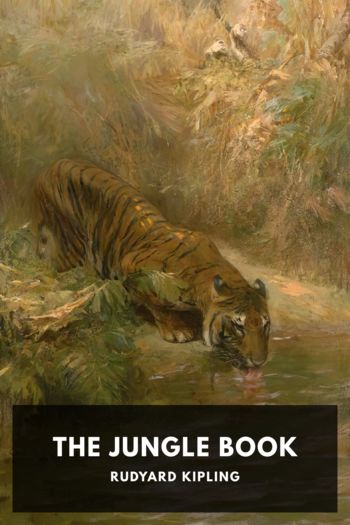Kim - Rudyard Kipling (top 50 books to read .TXT) 📗

- Author: Rudyard Kipling
Book online «Kim - Rudyard Kipling (top 50 books to read .TXT) 📗». Author Rudyard Kipling
“It is too high for me,” Kim muttered. “I am still all shaken. I am glad I hurt the man.”
“I felt that, sleeping upon thy knees, in the wood below. It disquieted me in my dreams—the evil in thy soul working through to mine. Yet on the other hand”—he loosed his rosary—“I have acquired merit by saving two lives—the lives of those that wronged me. Now I must see into the Cause of Things. The boat of my soul staggers.”
“Sleep, and be strong. That is wisest.”
“I meditate. There is a need greater than thou knowest.”
Till the dawn, hour after hour, as the moonlight paled on the high peaks, and that which had been belted blackness on the sides of the far hills showed as tender green forest, the lama stared fixedly at the wall. From time to time he groaned. Outside the barred door, where discomfited kine came to ask for their old stable, Shamlegh and the coolies gave itself up to plunder and riotous living. The Ao-chung man was their leader, and once they had opened the Sahibs’ tinned foods and found that they were very good they dared not turn back. Shamlegh kitchen-midden took the dunnage.
When Kim, after a night of bad dreams, stole forth to brush his teeth in the morning chill, a fair-coloured woman with turquoise-studded headgear drew him aside.
“The others have gone. They left thee this kilta as the promise was. I do not love Sahibs, but thou wilt make us a charm in return for it. We do not wish little Shamlegh to get a bad name on account of the—accident. I am the Woman of Shamlegh.” She looked him over with bold, bright eyes, unlike the usual furtive glance of hillwomen.
“Assuredly. But it must be done in secret.”
She raised the heavy kilta like a toy and slung it into her own hut.
“Out and bar the door! Let none come near till it is finished,” said Kim.
“But afterwards—we may talk?”
Kim tilted the kilta on the floor—a cascade of Survey-instruments, books, diaries, letters, maps, and queerly scented native correspondence. At the very bottom was an embroidered bag covering a sealed, gilded, and illuminated document such as one King sends to another. Kim caught his breath with delight, and reviewed the situation from a Sahib’s point of view.
“The books I do not want. Besides, they are logarithms—Survey, I suppose.” He laid them aside. “The letters I do not understand, but Colonel Creighton will. They must all be kept. The maps—they draw better maps than me—of course. All the native letters—oho!—and particularly the murasla.” He sniffed the embroidered bag. “That must be from Hilás or Bunár, and Hurree Babu spoke truth. By Jove! It is a fine haul. I wish Hurree could know … The rest must go out of the window.” He fingered a superb prismatic compass and the shiny top of a theodolite. But after all, a Sahib cannot very well steal, and the things might be inconvenient evidence later. He sorted out every scrap of manuscript, every map, and the native letters. They made one softish slab. The three locked ferril-backed books, with five worn pocketbooks, he put aside.
“The letters and the murasla I must carry inside my coat and under my belt, and the handwritten books I must put into the food-bag. It will be very heavy. No. I do not think there is anything more. If there is, the coolies have thrown it down the khud, so thatt is all right. Now you go too.” He repacked the kilta with all he meant to lose, and hove it up on to the windowsill. A thousand feet below lay a long, lazy, round-shouldered bank of mist, as yet untouched by the morning sun. A thousand feet below that was a hundred-year-old pine-forest. He could see the green tops looking like a bed of moss when a wind-eddy thinned the cloud.
“No! I don’t think anyone will go after you!”
The wheeling basket vomited its contents as it dropped. The theodolite hit a jutting cliff-ledge and exploded like a shell; the books, inkstands, paintboxes, compasses, and rulers showed for a few seconds like a swarm of bees. Then they vanished; and, though Kim, hanging half out of the window, strained his young ears, never a sound came up from the gulf.
“Five hundred—a thousand rupees could not buy them,” he thought sorrowfully. “It was verree wasteful, but I have all their other stuff—everything they did—I hope. Now how the deuce am I to tell Hurree Babu, and whatt the deuce am I to do? And my old man is sick. I must tie up the letters in oilskin. That is something to do first—else they will get all sweated … And I am all alone!” He bound them into a neat packet, swedging down the stiff, sticky oilskin at the comers, for his roving life had made him as methodical as an old hunter in matters of the road. Then with double care he packed away the books at the bottom of the food-bag.
The woman rapped at the door.
“But thou hast made no charm,” she said, looking about.
“There is no need.” Kim had completely overlooked the necessity for a little patter-talk. The woman laughed at his confusion irreverently.
“None—for thee. Thou canst cast a spell by the mere winking of an eye. But think of us poor people when thou art gone. They were all too drunk last night to hear a woman. Thou art not drunk?”
“I am





Comments (0)